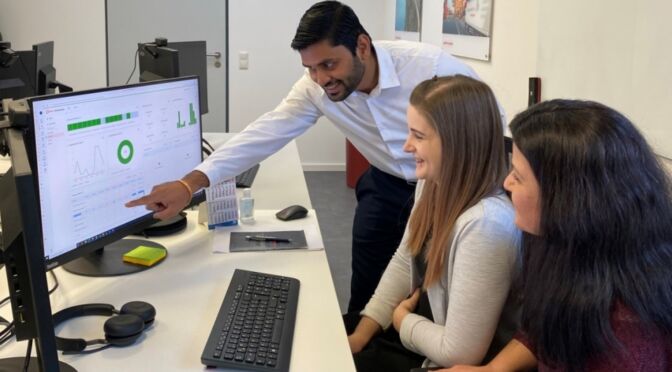We increase customer and employee satisfaction with Robotic Process Automation
Analog logistics brought into the digital age

The Andreas Schmid Group is a family-owned, medium-sized logistics company based in Gersthofen, Bavaria, near Augsburg. Founded by Andreas Schmid as a “transport business” in 1928, the company group now employs 1,600 people at over 30 locations in ten locations in Germany, the Czech Republic, and Hungary. The key to the medium-sized company’s success is to use digitization to develop innovative solutions for its customers. The portfolio of the company group now extends far beyond classic transport and warehousing services. In addition to freight forwarding and contract logistics, the Andreas Schmid Group offers its customers holistic solutions with start-up development, IT consulting, communication design, and personnel procurement.
In addition to internationalization, digitization is one of the most important strategic pillars of the medium-sized company Andreas Schmid Group. To keep the company on a long-term course for success, the digitization of processes plays a central role, especially. There are many starting points for this because, in the logistics industry, numerous pieces of information are still transmitted analogously on paper. As a pioneer, the Andreas Schmid Group naturally relies on intelligent digital systems such as a Customer Relationship (CRM) and a Warehouse Management System (WMS). To ensure a smooth interface between the analog and digital worlds and to keep administrative expenses and repetitive tasks as low as possible, the company was looking for intelligent automation solutions.
“With the help of automation, we are specifically bridging the gap between two existing worlds in logistics: the traditional paper-based world with printed delivery notes and the digital world with live tracking of shipments. Automation serves as a connector here and helps with digitization by taking repetitive tasks off our hands, for example, recognizing and transferring document information. This allows our employees to focus on creative and value-adding tasks such as individual customer care. In the next step, combining automation technologies with AI methods offers enormous opportunities to optimize process quality and efficiency, which must be seized,” says Dr. Matthias Schindler, Chief Digital Officer of the Andreas Schmid Group.
Order entry as the first successful use case
The topic of Robotic Process Automation (RPA) was initiated by the company’s in-house innovation lab “AS Lab.” After a presentation to the board, the company decided to test the technology in a proof of concept (PoC) for recurring controlling reports. Subsequently, further current challenges were identified in targeted process analyses. A burning issue was the entry of transport orders. This process requires a lot of information, including the content, type of packaging, pickup and delivery dates, contact details, possible hazardous substances, handling, and further characteristics of the shipment. The challenge is that not all customers of the company group have a data interface to their systems because they are new customers, do not work with compatible systems, or occasionally send shipments via the Andreas Schmid Group. As a result, the Customer Service department receives customer orders through various channels. To optimize the process, it was initially a top priority to establish a uniform approach to order acceptance. To automate the process, a form was created that reflects the core steps of the process. This was intended to ensure the highest possible acceptance among customers and keep the RPA solution simple. To enable automation via RPA, a precise, unchangeable definition of the input fields was observed. The newly developed process reduced the processing time from around 4 minutes to less than a minute per order. Automating this process alone has saved over 2,000 hours per year. The central automation team was responsible for the implementation. Analyses, documentation, and process descriptions were created hand in hand with the specialist departments, and solutions were tested together.
Intelligent collaboration between humans and robots as a success factor
Since then, the Andreas Schmid Group has automated more than 13 processes in a period of eight months. The RPA team received input on which processes are suitable for automation in a “top-down” approach at the beginning, by specifically addressing individual departments and conducting workshops with management. A new internal form allows all employees to submit their automation proposals, resulting in another 18 processes currently in the pipeline. In addition, the company group has developed a central operating and development model that supports departments in creating documentation and analyses. The team uses a variety of technologies for automation and combines API integrations with RPA. The robots are used not only in logistics and forwarding, but also at the IT service provider Quentia, which is part of the group.
An example to illustrate the time savings is a process from the pallet department: The Andreas Schmid Group works with many logistics partners who deliver goods from their warehouses on their pallets and sometimes return empty pallets in return. After delivery, the partner brings the documents, indicating whether and how many pallets were exchanged or returned. For the difference in pallets, the partner is billed. Employees have to search for the required data from several systems, check the documents, and enter them into the corresponding system. This time-consuming process is now optimized through a human-in-the-loop process: The software robot retrieves all necessary information and documents from the systems and provides them in a simple way in the Action Center. The employees now only have to process the task there and tell the bot whether, for example, it should create an invoice. This reduced the average processing time per tour number from 5 to under 1 minute. This time savings adds up to over 1,250 hours per year for a single process. In addition, the error rate has been significantly reduced. This allows the department to increasingly focus on special cases and new customer requirements.
These savings amortize the automation costs in a very short time. For the Andreas Schmid Group, the focus is not on the quantifiable advantages in terms of time, but rather on the increase in process quality, such as faster feedback to customers through faster data and process flows. To be able to see the time savings at any time, each process has its own dashboard for monitoring and tracking added value. The company finds the simple scaling and expansion of software robots through modular development particularly positive. The Automation Cloud is helpful because maintenance and updates take place there, allowing the team to focus on the essentials.
Goal achieved: more satisfied employees and customers
Based on these positive results, the Andreas Schmid Group rates automation as an important driver of digitalisation. In particular, the combination of several technologies – such as RPA with optical character recognition (OCR) and artificial intelligence – and the possibility of using robots with human input in the sense of the human-in-the-loop model opens up immense potential for increasing the efficiency and productivity of employees and the satisfaction of customers. The fact that the software robots take over recurring, repetitive and monotonous tasks relieves and frees the employees, who can now – as the company strives for in its mission statement – fully focus on customised customer solutions. In addition, they receive the active support of the bots.
“For us, automating processes is not just about the technology, but about the business and the people behind it. As often as possible, we try to involve our colleagues in our automation journey and show them the added value. That’s why we take enough time before automation to understand and optimise the processes and ways of working. Without the very good cooperation with the specialist departments, we would not be able to continue our Automation Journey so successfully,” says Enver Cetin, Process Automation Manager at the Andreas Schmid Group.
It is no wonder that the employees welcome the automation of processes. The Andreas Schmid Group has taken the workforce along on this innovation journey from the very beginning and has tried to involve them continuously through meetings or by presenting the results. In the process, the first important robot has emerged as a favourite: Every day at 7:30 a.m. on the dot, Rob Botone sends all managers the order situation of the previous day and the shipment volume compared to the previous year. This way, the managers start the day with an up-to-date status. Based on these all-round positive experiences, the company can also recommend RPA to medium-sized companies in particular. The advantage of the software robots: they achieve presentable results quickly and with little effort and are a perfect differentiator from the competition.
“For a medium-sized company, it is probably quite unusual to create its own team to digitise and automate processes. But our corporate strategy is geared towards meeting the challenges in the logistics industry, such as the shortage of skilled workers, through customised, innovative and digital solutions. The use of software robots is a promising way to do this. The initial successes show us that automation is also a sensible way to make processes more efficient in medium-sized businesses,” says Alessandro Cacciola, CEO of Andreas Schmid Group.
Numbers:
- Less than one minute: the automated order entry process that the Andreas Schmid Group implemented as a PoC. The annual time saved adds up to over 2,000 hours.
- 13 processes: Within just eight months, the Andreas Schmid Group has automated 13 processes. 18 more are currently in the pipeline.
- On average, an automation project takes less than 4 weeks from the idea to development to go-live.
- 1 Hybrid cloud structure for dynamic workloads and increasing analysis and monitoring of data


About Andreas Schmid Group
The Andreas Schmid Group is a leading expert for customised logistics solutions in Germany and abroad. Since 1928, the family-owned company from Gersthofen near Augsburg has focused on the sustainable success of its customers and is today considered a pioneer for the logistics of tomorrow. With 1,600 employees, the Andreas Schmid Group operates 260,000 m² of logistics space at over 30 locations in Germany, the Czech Republic, Hungary, Romania, and Slovakia. With its own Innovation Lab, a creative agency and a personnel service provider, the Group’s portfolio goes far beyond classic transport and logistics services – in line with the motto #logisticsbeyond.
For more information, visit www.andreas-schmid.de.
